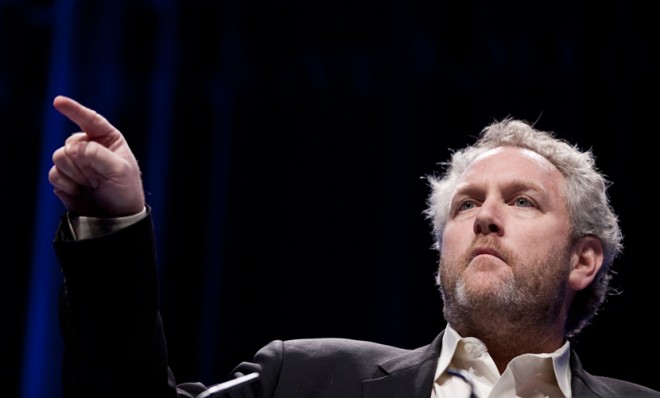I see dead people on Twitter. All the time.
This is definitely a first-world problem — if it's even a problem at all


A free daily email with the biggest news stories of the day – and the best features from TheWeek.com
You are now subscribed
Your newsletter sign-up was successful
I follow dead people on Twitter. They follow me back. It's a little strange.
My prolific Twitter pal @mattie96 (also known as Slim Pickens) passed away this summer. Sometimes people make a splash on Twitter only to recede from the public eye (@Cubachi, for instance), so it took me a while to figure out what had happened. In direct messages, Mattie had hinted that he might cut back on Twitter, so when his tweets disappeared, I sort of assumed he was just taking a break:

Unfortunately, this was more than just a reprieve from the political maelstrom. Mattie was dead. There would be no more tweets or DMs.
The Week
Escape your echo chamber. Get the facts behind the news, plus analysis from multiple perspectives.

Sign up for The Week's Free Newsletters
From our morning news briefing to a weekly Good News Newsletter, get the best of The Week delivered directly to your inbox.
From our morning news briefing to a weekly Good News Newsletter, get the best of The Week delivered directly to your inbox.
I consider him a friend, even though we never met. Until his death, I had no idea what he looked like. But the tragic news of his death sent me reeling — probably more so than other deaths of other friends I had met.
This is simultaneously weird and perfectly normal.
On Twitter, Mattie used an alias, so I never knew his real name. I suppose he could have been anybody. Still, it was obvious to me that he was a very intelligent person, and, despite his penchant for political snark, one could easily sense a real humanity. (Read about the real Mattie here.)
But here's the thing: Mattie is still following me on Twitter. And I'm still following him. This arrangement will presumably go on indefinitely. He can't unfollow me, and I won't unfollow him. It might seem odd, but having him there is comforting to me. Unfollowing him wouldn't just be unseemly — it would have an unsettling finality to it.
A free daily email with the biggest news stories of the day – and the best features from TheWeek.com
I just can't do it. At some level, maybe I can pretend his death isn't real if I don't hit that "unfollow" button.
Mattie isn't the only example, of course. I have this same arrangement with @AndrewBreitbart (whom I did know). We still follow each other. This gives me comfort. There are, no doubt, others.
We build communities based on social networks. Sometimes we meet our online friends at conferences, but sometimes we have real relationships with people we will never meet. And we don't just mourn the losses. As I write this, conservatives on Twitter are rooting for the recovery of our friend Jim Hoft (@GatewayPundit), celebrating birthdays and marriages of others, and helping the family of our friend and colleague Caleb Howe. (Many of the people offering their heartfelt prayers and support have, no doubt, never actually met one another. Or if they did, it was for a fleeting moment as they scurried to or from some CPAC conference room to a breakout session.)
Aside from helping us mourn our losses, celebrate our milestones, and cheer our ill, Twitter seems to also serve as a way to memorialize our fallen — to remember friends who are no longer with us. Sometimes, we even tweet them — or, at least, use their Twitter handle. Here's an example from this weekend where conservatives on Twitter used the occasion of a college football game to remember their friend Chip Gerdes (@TookieW):

You can contact Twitter and let them know about a deceased user. But why would you? Aside from confronting the finality, this is the electronic version of pulling the plug. As George Carlin said, "Leave my plug alone."
We're all probably following the deceased. And they're haunting us on Twitter. And somehow, this provides a small bit of comfort. They never really leave us. As fleeting as our digital world is, some things are permanent.
Matt K. Lewis is a contributing editor at TheWeek.com and a senior contributor for The Daily Caller. He has written for outlets including GQ Politics, The Guardian, and Politico, and has been cited or quoted by outlets including New York Magazine, the Washington Post, and The New York Times. Matt co-hosts The DMZ on Bloggingheads.TV, and also hosts his own podcast. In 2011, Business Insider listed him as one of the 50 "Pundits You Need To Pay Attention To Between Now And The Election." And in 2012, the American Conservative Union honored Matt as their CPAC "Blogger of the Year." He currently lives in Alexandria, Va.
-
 Political cartoons for February 21
Political cartoons for February 21Cartoons Saturday’s political cartoons include consequences, secrets, and more
-
 Crisis in Cuba: a ‘golden opportunity’ for Washington?
Crisis in Cuba: a ‘golden opportunity’ for Washington?Talking Point The Trump administration is applying the pressure, and with Latin America swinging to the right, Havana is becoming more ‘politically isolated’
-
 5 thoroughly redacted cartoons about Pam Bondi protecting predators
5 thoroughly redacted cartoons about Pam Bondi protecting predatorsCartoons Artists take on the real victim, types of protection, and more
